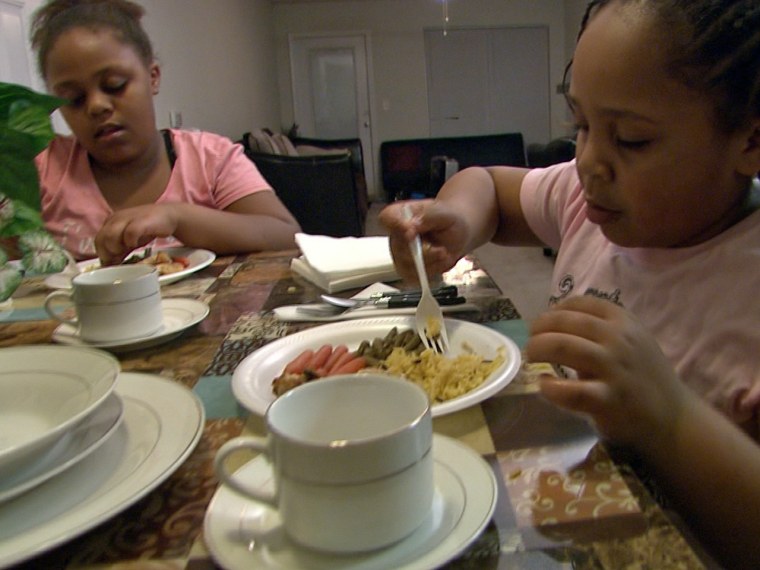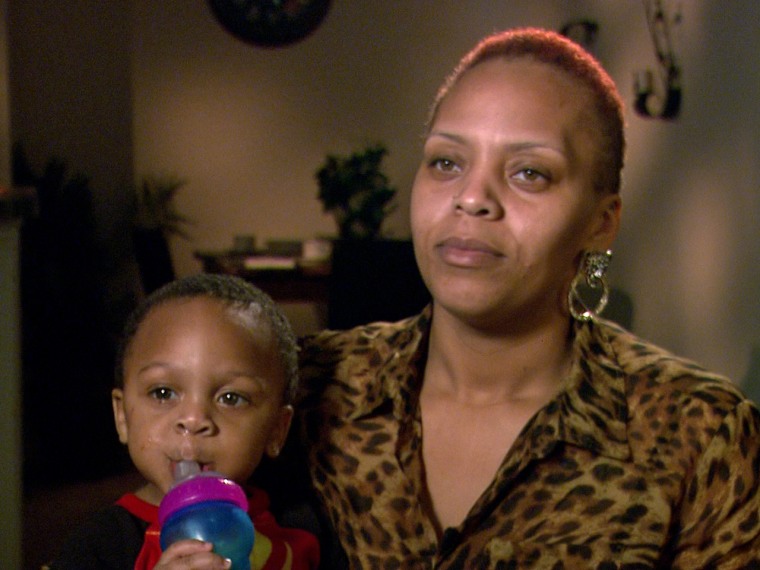
A child's weight in kindergarten can foreshadow a struggle with obesity later in life — and the warning signals probably start even earlier than that, a large new study has found.
Overweight kindergartners are four times as likely as healthy-weight children to become obese by the eighth grade, and this new report, published Wednesday in the New England Journal of Medicine, adds to growing evidence that a person's "weight fate" becomes established at a very early age.
Previous studies have shown that children and adolescents who are overweight or obese stay that way into adulthood. It's a wake-up call to parents, researchers say: If a kindergartner is visibly overweight, this is might not be something he or she will "grow out of." The point of intervention for childhood obesity needs to be in the toddler and pre-K years — ideally, even before birth, childhood obesity experts say.
“A lot of risk may be set in place by the age of 5, so you really have to focus on those very young ages,” says Solveig Cunningham, lead author of the paper and an assistant professor of global health at the Rollins School of Public Health at Emory University in Atlanta. “What we’re seeing is, among the kids that become obese, a lot of that happens the first few years in elementary school.”
Cunningham and her colleagues used data from a study by the National Center for Education Statistics, focusing on 7,738 kids who were kindergartners in 1998. The kids’ weight and height were measured seven times between 1998 and 2007.
Fourteen percent of the kids were overweight, but not yet obese, when they started kindergarten. By the time those kids entered eighth grade, about a third of them had become obese, compared to the 8 percent of their normal-weight kindergarten classmates who became obese by the same age.
The study also found a double-whammy for overweight kindergartners who also had a high birth weight: Kids who weighed about 8 pounds, 13 ounces or more at birth and were overweight by the time they started kindergarten had the highest risk of becoming obese by age 14.
This means the time to prevent childhood and adolescent obesity is before elementary school begins, and intervention needs to happen in toddlerhood, or even during pregnancy, obesity experts say.
“Several key preventive measures would include avoidance of excessive weight gain during pregnancy, breastfeeding for a least a few months and initiating a healthful diet early in life,” said Dr. David Ludwig, director of the Optimal Weight for Life Clinic at the Boston Children’s Hospital. That means a healthy diet for the whole family, because research has shown that a family's lifestyle is a major factor in whether a kid will become obese. One 2008 study showed that teens were more likely to be overweight or obese if their families did not frequently eat together, or if the whole family spent a lot of time in front of the TV.
“Our paper talks more to the timing than to what might actually work,” Cunningham said. “But a lot of it is probably family-based. These are the ages in which kids’ preferences and tastes and likes are set. By the age of 3, they already know what they like … and really promoting a healthy lifestyle and diverse diet at those early ages, really sets their preferences.”
There's no doubt that the younger the child is, the easier it is to make healthy behavior changes. But Cunningham doesn’t want parents of a child who’s already overweight to become discouraged.
“I think the numbers have a positive side: A third of overweight kindergartners become obese. But two-thirds don’t. So, yes, the risks are higher, but it’s not a matter of fate,” she said.
Andrea Lewis, a North Carolina mother of two, knew she needed to take action to change her family's health habits last year, when she needed bypass surgery.

"I said, you know, it's time that we get on it together, lose weight together," Lewis said. "'Because you don't want to be like your mom, you don't want to be a big girl all your life."
Lewis enrolled her daughters — 5-year-old Zaniyah, who weighs 98 pounds, and 8-year-old Emoni, who weighs 174 pounds — in the Duke Children's Healthy Lifestyles Program. Lewis and her family are black, and this new research showed that black and Hispanic kids have a higher risk for becoming obese adolescents.
“We did find disparities in risks of becoming obese between for kids between kindergarten and 8th grade — almost 17 percent of non-Hispanic Black and 14 percent of Hispanic kindergartners became obese eighth graders, compared with about 10 percent of non-Hispanic white kids,” Cunningham said.

But the Lewis family, which includes a toddler son, has made healthy lifestyle changes in an effort to stop that from happening. The girls now play basketball and take yoga classes with the Duke program, and Lewis says the family has made diet changes, too, although that's been more challenging.
"It's hard to change what they like to eat because they're used to eating a certain way," Lewis says. "I think if I would've started them out, you know, eating healthy, then they would be used to eating healthy, so that's what they would do. But since they're starting out with McDonald's and whatever, fried foods, that's what they really lean towards." Now, the family eats more fruits and veggies, they go out to eat no more than once a week, and they get only one unhealthy snack per day.
"We're going to lose weight together as a family," said Lewis, who has lost 90 pounds since her heart surgery. "I will work out with you guys, and if Mama can do it, if I can run or some jumping jacks, then you can run and do jumping jacks as well."